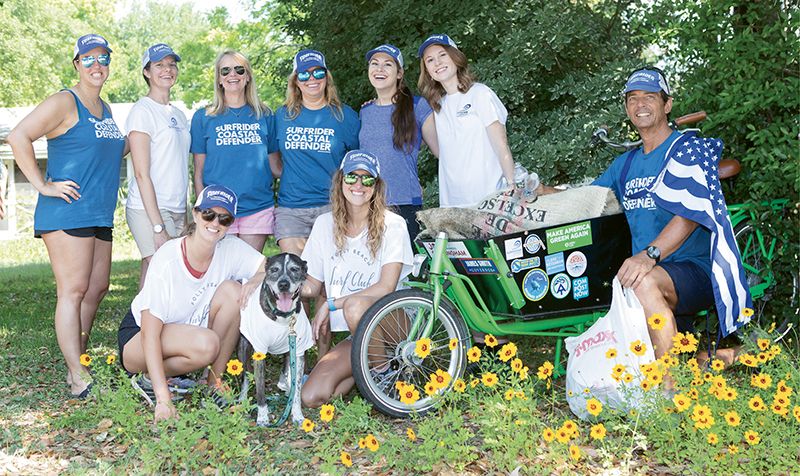Charleston Surfrider Foundation works to keep the beach and ocean clean for everyone

Team Effort: Surfrider Foundation’s Charleston chapter fights to curb pollution and preserve the coastal environment.
Nobody likes seeing litter on the beach. But when garbage turns life-threatening—as it did in 2017, when a green sea turtle at the SC Aquarium required surgery to remove a one-inch fragment of plastic—the volunteers at Charleston’s chapter of the Surfrider Foundation channel frustration into action.
“I’ve stood in the marsh and watched a little crab crawling over pieces of microplastic, and thought, ‘This animal is going to end up dying from that.’ It’s alarming,” describes Marlo Shedlock, Charleston Surfrider chapter chair.
The advocacy organization of surfers and ocean lovers formed a group of surfers from Malibu, California, were concerned about the health risks associated with environmental threats posed by escalating coastal development at their favorite surf spot; it has grown to 81 chapters around the country. Nationally, the group advocates for maintaining public beach access, slowing climate change, curbing pollution, and preserving the coastal environment. Charleston’s chapter, which formed in 2000, focuses on educating the community and fighting for legislation that reduces the presence of harmful single-use plastic items, preventing seismic testing and offshore oil drilling, litter reduction, and improving water quality. According to a 2016 Citadel study, as much as 7.5 tons of plastic are in Charleston Harbor; when plastic breaks down to become nearly microscopic, it can be readily absorbed by animals.
“The goal is to get as much trash off the ground as we can, but we also bring data sheets and document every single thing,” Shedlock explains.

Cleanup Crew: Volunteers pick up trash during a Morris Island beach sweep.
In 2018, the group removed 87,223 pieces of litter from more than two dozen cleanups. They rely on this data when they speak in front of city councils and state government to advocate banning plastic bags, straws, or Styrofoam. Surfrider also used the data to persuade 135 local restaurants to permanently ditch plastic straws after Surfrider’s Strawless Summer campaign.
In between advocating for ocean conservation, Shedlock—whose day job is as the county’s Adopt-A-Highway coordinator—often heads to the beach or a marsh to lead employee groups from Costa, Wells Fargo, or Google on Surfrider-sanctioned sweeps.
But it’s not all work for Shedlock; she finds time to enjoy the ocean, too. Her fellow Surfrider volunteers recently gifted her with a new surfboard. An Outer Banks native, Shedlock says that Folly Beach’s steep drops are a challenge. “I’ve never had to paddle so hard to catch a wave!” she admits. Fortunately, she’s no stranger to hard work.
Want to get involved? On June 14, join Surfrider and South Carolina Oyster Restoration & Enhancement in building a reef out of recycled oyster shells. Find more info at surfrider.org.
Photograph courtesy of (beach sweep) Surfrider Foundation